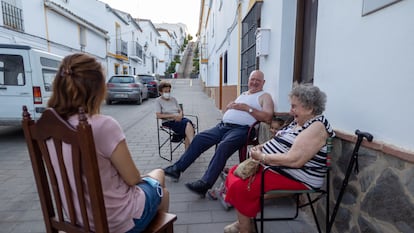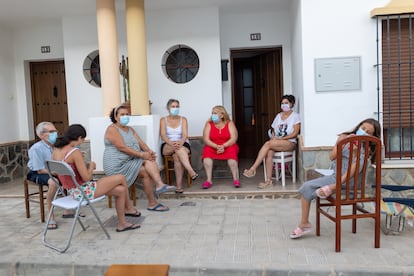The Spanish village that wants outdoor chats to be granted World Heritage status
Algar in southern Spain is seeking UNESCO recognition for ‘charlas al fresco’ in a bid to revive the declining tradition


It has been two weeks since residents of the southern Spanish village of Algar won €20,000 in a lottery, a subject that was examined in detail by locals during their evening chats on the town’s sidewalks. “It was a juicy piece of news,” says Antonia Aguilera, sitting out in a circle of chairs with six of her neighbors. “The baker won as well as a lot of people who needed it.”
The windfall attracted a brief media circus to Algar, which is located in Cádiz province in Andalusia and is home to 1,400 people. Now, when the sun goes down, the locals huddle together to talk about a different topic – the call to get charla al fresco – or alfresco chats – recognized by UNESCO as a cultural treasure.
We stay until dinner, go inside for that, and then we come out again until midnightJosé Ibáñez, 81-year-old resident of Algar
“My mother is 82 and sits on her street every day,” says Algar mayor José Carlos Sánchez, who announced the idea on the local government’s Facebook page on July 28. “There are days when I pass by after work, sit down and we catch up. It’s the most beautiful moment of the day.”
The mayor could hardly have imagined the stir his Facebook message would stir. Ironically, Sánchez was partly encouraged to seek World Heritage status after seeing the negative impact social networks like Facebook were having on the tradition.
Algar’s Sol street is steeply inclined and has 124 steps. Thirty years ago, José Ibáñez, 81, counted them to see how many neighbors would fit on them. “Every afternoon, the steps would be filled with families chatting, playing bingo and having dinner. We had a great time,” he says. Rarely has he or his wife, Francisca Sánchez, or his neighbor Catalina Sánchez missed a summer evening chat. “We are already out as the sun is setting,” says Ibáñez, relaxing in his plastic chair. “We stay until dinner, go inside for that, and then we come out again until midnight.” He knows, however, that this is a dying tradition. The week before, only they and four young people were observing it.
It is difficult to trace where the tradition comes from. Anthropologist Gema Carrera believes that it derived from a need to cool off in the evening as well as being social, while Isidoro Moreno, professor of anthropology at the University of Seville, says: “It was a spontaneous get-together with neighbors after dinner in times before television and air conditioning.” What is clear is that it is not exclusive to Algar; rather it is linked to a rural and more leisurely lifestyle, though it persists in some cities too. “The custom is Mediterranean because it also occurs in southern Italy and Greece,” says anthropologist Eva Cote.

“To attribute it to any one town or region seems like nonsense to me,” says Moreno. In Algar, they are well aware their custom is not theirs alone. “It’s not unique to here,” says the mayor. “Chatting outdoors is everyone’s heritage. I would not mind sharing the initiative, just that it comes from here at least.” The town council has already sent a formal request to the provincial delegation of Andalusia’s culture department, which is the first step in seeking World Heritage status. The process can last years, requiring anthropological reports and, above all, a lot of public and institutional support, until it is finally proposed to UNESCO, where it will vie for attention with a multitude of rites, festivals, customs and knowledge from all over Spain, such as the Carnival of Cádiz.
Tradition in decline
Cote believes these alfresco evening chats began to decline in many towns in Andalusia in the early 1970s, when urban development started to replace one-story homes with blocks of apartments and single-family houses. In Algar, the decline began decades later with the emigration of many inhabitants to surrounding cities and an increased sense of insecurity, causing many neighbors to keep their doors shut. Nevertheless, Sánchez says there are still many locals who continue to gather outdoors in this way and believes that UNESCO protection could help to revive the custom among young people. “Nowadays, it’s older men and women who go out,” he says. “It depends on the streets and neighborhoods, but there are areas that are still full of groups chatting. For many, it is a time they can tell each other about their day – it’s almost therapeutic.”
There is no lack of open doors or collections of colorful chairs on the pavement of Antonia Aguilera street. That is, until someone comes out and yells: “It’s already midnight, come and put the washing machines on!’ as one local explains with a chuckle, referencing Spain’s new electricity billing system. When the sun was at its highest at the start of August, the white-painted homes deflected the 34ºC heat. At sunset, it was barely 23ºC and dropping. Twenty-somethings Olga and Celia Lobato were the only young people, along with their partners, sitting out on the steps on Sol street. There was a lot to discuss; besides the lottery win and the subsequent influx of journalists, vandals had pushed the town’s sailboat into a nearby marsh. “We all know each other really well,” laughs Olga. “We are united but we also criticize each other. The truth is it’s more entertaining than the social networks.”
English version by Heather Galloway.
Tu suscripción se está usando en otro dispositivo
¿Quieres añadir otro usuario a tu suscripción?
Si continúas leyendo en este dispositivo, no se podrá leer en el otro.
FlechaTu suscripción se está usando en otro dispositivo y solo puedes acceder a EL PAÍS desde un dispositivo a la vez.
Si quieres compartir tu cuenta, cambia tu suscripción a la modalidad Premium, así podrás añadir otro usuario. Cada uno accederá con su propia cuenta de email, lo que os permitirá personalizar vuestra experiencia en EL PAÍS.
¿Tienes una suscripción de empresa? Accede aquí para contratar más cuentas.
En el caso de no saber quién está usando tu cuenta, te recomendamos cambiar tu contraseña aquí.
Si decides continuar compartiendo tu cuenta, este mensaje se mostrará en tu dispositivo y en el de la otra persona que está usando tu cuenta de forma indefinida, afectando a tu experiencia de lectura. Puedes consultar aquí los términos y condiciones de la suscripción digital.








































